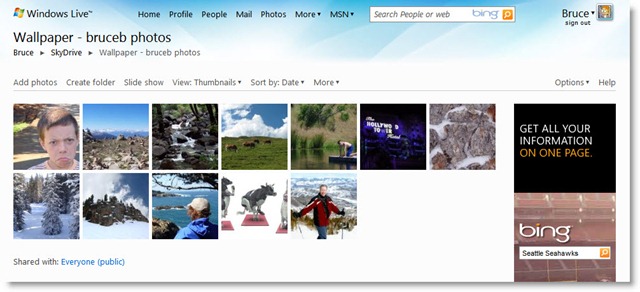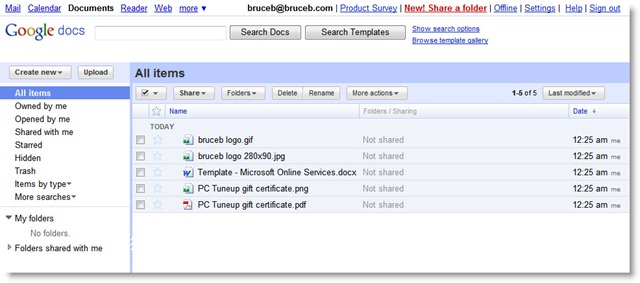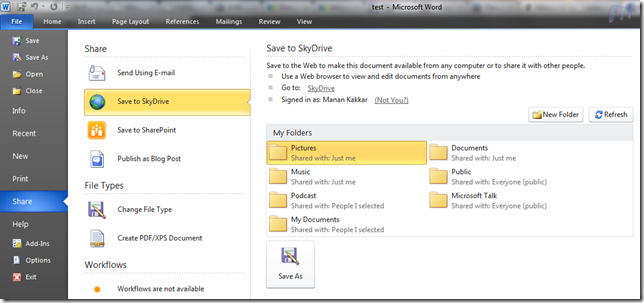 Google announced today that you will soon be able to store any kind of file online in Google Docs, which until now has been basically limited to text and spreadsheets. Anyone with a Google Account will be able to store 1Gb of files online and access them from any computer.
Google announced today that you will soon be able to store any kind of file online in Google Docs, which until now has been basically limited to text and spreadsheets. Anyone with a Google Account will be able to store 1Gb of files online and access them from any computer.
If you’ve been following along, then this sounds like old news. Microsoft has let you store files online for free using Windows Live Skydrive since 2008, with a current storage limit of 25Gb, not a paltry 1Gb. There are some differences – Google will allow you to upload a single file that’s as large as 250Mb, Skydrive is limited to 50Mb files (both limits presumably to mollify the entertainment industry); Google will let you buy additional storage space, Microsoft does not. Size limits will rapidly change with both services, I’m sure.
There are other differences that might carry more weight:
- Microsoft’s presentation is infinitely more polished than the barebones Google Docs file list. (Samples below.) Simplicity is nice but at the moment Skydrive is more pleasant to work with.
- Google is not Microsoft. Many people will pick the Google service for this reason alone.
This is a photo folder in Windows Live Skydrive:
This is a folder in Google Docs with a mixture of file types. It looks pretty plain next to the Skydrive page, for better or for worse:
There is one shortcoming, though, that unfortunately is the same for both services: neither is integrated into Windows to give you the ability to use the online storage directly from your programs. All uploading and downloading is done from an Internet browser.
In my vision, you’d have a drive – the “Y:” drive, say – that you could reach just as easily as your document or picture folders. When you save a Word document or a photo or a Powerpoint presentation to the Y: drive, it is automatically stored online. Maybe that’s because it goes there directly or maybe it’s taken there by some sync mechanism – but you can get to it from any program on your computer.
It seems obvious and important.
There are no plans for Google or Microsoft to make that happen. If either of them is working on it, they’re being very tight-lipped.
Granted, there are some third-party programs that accomplish small parts of that integration.
- Skydrive Explorer is a third-party app that provides access to Skydrive in Windows Explorer for some chores – uploading and downloading files, renaming and rearranging files and folders. It does not work within programs, though – no direct access from Word to files stored in Skydrive, for example.
- In its announcement, Google pointed to third-party app Memeo Connect and a couple of others as possible ways to accomplish the same kind of integration for enterprise users of Google Apps Premier Edition (meaning, roughly, not you or me).
That’s not the same thing as having Microsoft and Google take responsibility for doing this integration natively! We shouldn’t have to chase after add-on programs from unknown developers.
It’s hard to say what Google will come up with but Microsoft appears to be completely uninterested in providing unfettered access to Skydrive. Instead, it is providing limited access to the online files from particular programs.
- Windows Live Photo Gallery can store files in an online album stored in Skydrive, and entire folders can be downloaded from Skydrive and appear in the photo program. It’s a nice feature but nothing like full access to work with the online pictures directly.
- The biggest step forward will be the final release of Office Web Applications, which will allow integrated access to Office documents stored online in Skydrive folders. You’ll be able to work with your files online or in the Office programs installed on your computer as easily as if the documents were stored on your local hard drive. Great, huh? Maybe not.
I am furious about this screen shot:
It appears that Microsoft may only provide integrated access to Skydrive for users of Office 2010, the next version of Office due in the spring. Were you planning to pony up a few hundred dollars for a new version of Microsoft Word? Neither was I.
Google and Microsoft can both do better.




Trackbacks/Pingbacks